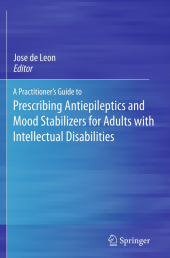 Neuerscheinungen 2012Stand: 2020-01-07 |
Schnellsuche
ISBN/Stichwort/Autor
|
Herderstraße 10
10625 Berlin
Tel.: 030 315 714 16
Fax 030 315 714 14
info@buchspektrum.de |

Jose De Leon
A Practitioner´s Guide to Prescribing Antiepileptics and Mood Stabilizers for Adults with Intellectual Disabilities
Herausgegeben von de Leon, Jose
2012. xxxi, 507 S. XXXI, 507p. 235 mm
Verlag/Jahr: SPRINGER, BERLIN 2012
ISBN: 1-461-42011-3 (1461420113)
Neue ISBN: 978-1-461-42011-8 (9781461420118)
Preis und Lieferzeit: Bitte klicken
This guidebook explores the anticonvulsants and mood stabilizers used to treat adults with intellectual disabilities (ID). The text addresses the overlap between what neurological literature refers to as anticonvulsants, with what and the psychiatric literature calls mood stabilizers.
Emotional, behavioral, and neuropsychiatric conditions are common in individuals with intellectual disabilities (IDs), most notably epilepsy, aggression, self-injurious behaviors, and bipolar and other mood disorders. Despite the prevalence of such problems, there is a scarcity in the literature of reliable information on medical treatments for those with IDs.
A Practitioner´s Guide to Prescribing Antiepileptics and Mood Stabilizers for Adults with Intellectual Disabilities provides a detailed framework for prescribing for this challenging population. Featuring the most up-to-date information on factors that inform prescribing, the Guide addresses basic issues and controversies (e.g., the rift between evidence-based and personalized medicine) in treating adults with cognitive deficits. Clients´ specific needs are emphasized in developing appropriate and effective pharmacological intervention for improved outcomes and quality of life. Drugs discussed in the Guide include carbamazepine, clonazepam, diazepam, ethosuximide, felbamate, gabapentin, lacosamide, lamotrigine, levetiracetam, lithium, lorazepam, oxcarbazepine, phenobarbital, phenytoin, pregabalin, primidone, rufinamide, tiagabine, topiramate, valproate, and zonisamide. For each of these compounds, the guidelines cover:
Indications for use; relative and absolute contraindications.
Assessment during treatment; therapeutic drug monitoring; warning signs and symptoms for caretakers.
Dosage: administration; initial and maximum recommended dosage; modifications associated with drug-drug interactions, personal characteristics, and (where appropriate) genetic variations.
Adverse drug reactions: common, relatively uncommon, and potentially lethal, plus risk of metabolic syndrome.
Guidelines for discontinuation.
References, tables, and drug utilization reviews.
A Practitioner´s Guide to Prescribing Antiepileptics and Mood Stabilizers for Adults with Intellectual Disabilities is an indispensable decision-making reference for psychiatrists, neuropsychologists, psychopharmacologists, neurologists, internists, and clinical psychologists.
From the reviews:
"A valuable contribution to the literature and helps fill several identified gaps. ... The authors provide a well-balanced, extensive review of the literature, concisely yet thoroughly summarizing hundreds of articles into one user-friendly reference for the busy clinician. The authors present complex, detailed information in a well-organized, sophisticated yet easy-to-read style, enhancing the book´s clinical utility and applicability. ... a valuable resource for a broad array of mental health and medical clinicians who treat epilepsy, mood disorders, and challenging behaviors in adult individuals with IDs." (Rachel E. Myers, Journal of Child and Family Studies, Vol. 21, 2012)


